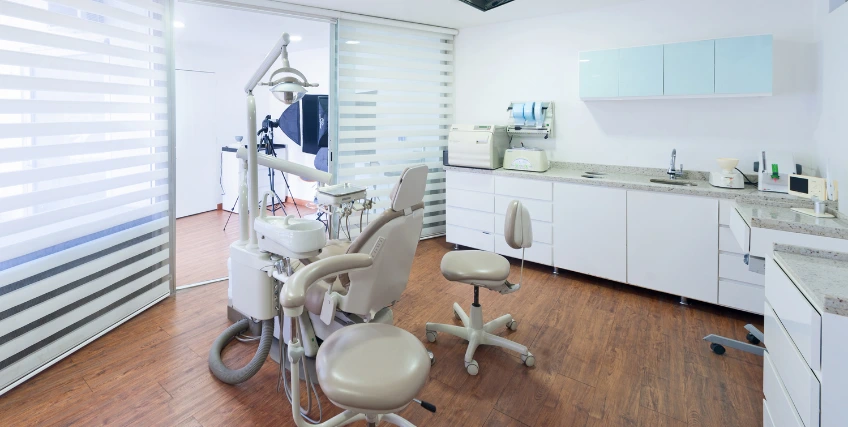Achieve Success with Simplified Dental Practice Financing
February 05, 2025 | Last Updated on: February 06, 2025

Achieve Success with Ease: Simplified Dental Practice Financing and Loan Options
Whether you’re a new dental school graduate ready to start a new practice or a seasoned dentist who wants to expand your existing business, dental practice financing is something to consider.
If you’re starting from the ground up, you’ll need a commercial building in a prime location, state-of-the-art equipment, working capital, and more. If you’ve been in business for a while, it may be time for new equipment or even renovation. Either way, a dental office loan can provide the funds your practice needs to thrive.
In this article, we’ll explain how understanding your financing options and exploring ways to simplify the dental loan process can help you achieve success more easily.
But first, let’s look at the benefits of dental practice financing.
Dental Practice Financing Benefits
Dental practice financing can benefit both new practice owners and those who’ve been in business for a while. You can use a dental loan for a practice acquisition, to start your new practice, expand an existing business, or open a second location. both new practice owners and those who’ve been in business for a while. You can use a dental loan for a practice acquisition, to start your new practice, expand an existing business, or open a second location.
Here’s a more comprehensive look at what a dental office loan can be used for:
Funding Startup Costs
Some dentists prefer to own their dental office rather than lease it. This means purchasing and financing a commercial office building to operate their practice.
Even if you decide leasing is better, you’ll still need enough capital to cover your lease expenses for a year or so until your practice is up and running.
Other startup costs include:
- equipment and supplies
- hiring staff
- marketing expenses
- operational expenses for several months (this includes utilities, lab expenses, insurance, etc.)
Expanding or Renovating an Existing Dental Practice
Some small business owners eventually must expand or renovate their business to stay in the game. The dental profession is no exception.
Maybe your current practice can’t adequately serve all of its patients. In this case, you may consider opening a second location and bringing in partners. Or perhaps your office space can use a renovation to keep things fresh and inviting. You might need new equipment to make your patients feel more comfortable and to stay competitive. Or you may consider acquiring another practice to grow your business.
Refinancing Existing Dental Office Loans
Perhaps you’ve already gotten a few dental office loans. Maybe you had to accept a higher interest rate when your credit score wasn’t optimal. Or maybe you just got your loans when interest rates were higher.
Refinancing your existing dental practice debts into a consolidation loan might be the answer to paying less overall on your dental loans.
Types of Dental Practice Financing
There are several dental practice financing options available, each offering funding for a specific purpose. Understanding these options can help you make more informed decisions when seeking a business loan.
You can seek dental practice financing from a traditional lender, such as a bank or a credit union, through the Small Business Administration (SBA), or an alternative or online lender.
Traditional lenders and the SBA typically offer good loan terms. However, the application process can be slow and complicated, and they also may have firm credit requirements that some borrowers can’t meet.
Alternative lenders are usually more flexible in their requirements, with the result that borrowers can get money faster even if they have less creditworthiness.
Commercial Real Estate Loans
Commercial real estate or CRE loans traditionally provide capital to purchase or acquire real estate to run a business. Some CRE financing solutions allow you to tap into your existing commercial real estate equity to refinance dental office loans, renovate your office space, or grow your business.
Term Loans
Term loans provide upfront funding and are paid back with regular monthly payments until the loan is paid off. Most term loans are short-term loans with a repayment period of two to five years.
Term loans can be used to grow your business, acquire new equipment, and access working capital.
Equipment Loans
Dentistry is continually evolving and seeing upgrades. State-of-the-art dental equipment and technology are essential for any dental practice to thrive and stay competitive. Dental patients want solutions that provide the most comfort and convenience.
Unfortunately, dental equipment is expensive. However, equipment financing can break down the costs into smaller, more manageable payments.
Equipment loans can also be easier to get than other types of financing, because equipment purchased with the loan funds serves as collateral.financing, because equipment purchased with the loan funds serves as collateral.
Working Capital Loans
The daily operational expenses of running a dental practice can be quite high. Payroll for dental hygienists, dental assistants, and lab technicians, supplies and inventory, insurance, utilities, and more require a lot of working capital.
Dental practices may encounter a dry spell when their patient load doesn’t cover these operational expenses. For example, a natural disaster could mean you’re out of the office for a few days or more. Or maybe flu season has more patients calling in sick and missing appointments.
A working capital loan can help maintain your practice’s operational expenses until your dental practice recovers and is back to business as usual.
Business Lines of Credit
A business line of credit works a lot like a credit card. With a line of credit, you’re pre-approved up to a set loan amount and you can draw from the credit line as needed. You only pay on the amount of credit you use. Anything paid back is added back to the line of credit.
One advantage of a business line of credit is that it allows you to pay for essential expenses without draining your dental practice’s cash flow.
Revenue Based Financing
Revenue-based financing is a popular solution for small business owners with lower credit scores or those who haven’t been in business for long. It is also a flexible financing solution that can be used for many purposes, including expansion opportunities, staffing, equipment and inventory purchases, operational expenses, and more.
Repayment for revenue-based financing is based on an estimated projection of your future account receivables.
The primary advantage of revenue-based financing is it’s one of the fastest funding solutions available.
Tips When Applying for a Business Loan
Using dental practice financing can be a helpful asset to grow a dental practice. However, applying for a business loan and getting approved are different. Lenders typically have strict underwriting criteria before they approve a small business loan.
Understanding your business needs and each lender’s criteria can help make the loan application process easier. It can also help you be more successful in getting the financing you need.As you compare your financing options and explore which lender is best, consider the following:
- The types of dental practice loans and how they can be used
- The minimum and maximum amount a loan provider allows
- Repayment terms
- Fees charged by a lender
- Dental practice financing interest rates
- Credit score and business requirements to receive approval
- How fast you can receive funds
These are important criteria to consider. For example, if an important piece of dental equipment breaks and interferes with your ability to deliver comprehensive dental care, you’d want fast funding. The same is true if your annual taxes and insurance premiums are due and you don’t have the cash to pay them.
However, most traditional lenders, like banks and credit unions, don’t approve small business loans quickly. In that case, you’d probably need to get your dental practice financing through an online financing provider.
Whichever option you choose, it’s essential to understand they’ll have a common objective: to ensure you have a solid business plan that outlines how you plan to use the funds, how much revenue your business produces, and your ability to repay the loan.
What to Include in Your Dental Practice Financing Business Plan
As we previously pointed out, most lenders look for a sound business plan as part of the application process. A good business plan consists of several moving parts.
At a minimum, a business plan will include the following:
- Summary: A summary should have information about you, your dental practice, services offered, business location, and how you plan to grow your business and achieve your goals.
- Financial documents: These should include income statements, cash flow statements, balance sheets, projected income and cash flow statements, tax returns, business checking account statements, etc. Each lender will have its own criteria regarding financial documents, so it’s best to learn what those are before compiling your business plan.
- Use-of-funds statement: This will describe how much you want to borrow and how you plan to use the funds.
Traditional lenders and the SBA are more likely to require a comprehensive business plan than an online lender. It’s essential to include any documentation required by your lender as it can delay the application process.
FAQs
What type of dental business loan rates can I expect?
Dental practice financing vary by lender.
What are some easy to get business loans for a dental practice?
Alternative loans from online business loan providers are usually the easiest as they have streamlined application processes and different underwriting processes.
What credit score do I need for dental practice financing?
It depends on the lender. The SBA typically requires a minimum of 650, while banks prefer at least 680. Meanwhile, online lenders sometimes offer loans to small business owners with credit scores as little as 575. However, remember, the best repayment options and lower interest rates are reserved for borrowers with credit scores over 700 and more time in business.
How much can I borrow with a dental office loan?
This varies by lender. A larger bank might cap small business loan amounts at $500,000 while the SBA loans up to $5,000,000 for a (7)a loan.
How long can I take to repay dental practice financing?
This depends on the lender and the type of loan. On average, five years or less is common with banks and online lenders. Longer repayment periods are sometimes allowed by the SBA, depending on the useful life of the collateral.
Frequent searches leading to this page




